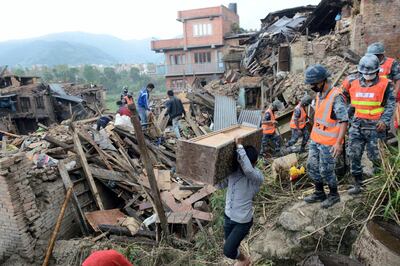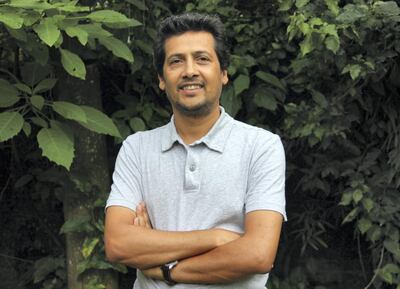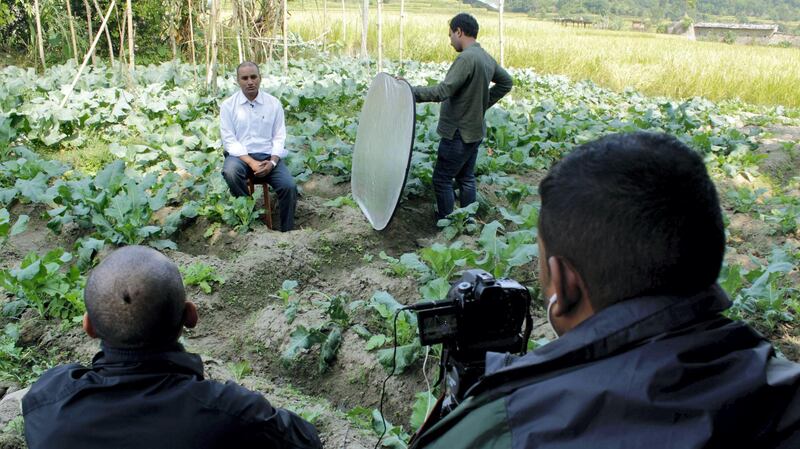Hope has been in short supply in Nepal of late. An earthquake in April 2015 killed almost 9,000 people, destroyed hundreds of thousands of homes and buffeted the country's economy, while the shadow of a decade-long war between the government and Maoist insurgents lingers over a divided political landscape despite it ending in 2006. Corruption is rife, and for regular Nepalese, dealing with the state's lumbering bureaucracy can be infuriating.
But by drawing an unlikely link between young people's interest in reality television and the problem of corruption, an international non-profit called Accountability Lab is taking on the institutional graft that has blighted the country for decades.
The brainchild of Nepali Narayan Adhikari and Accountability Lab founder Blair Glencorse, a Briton, reality TV show Integrity Idol aims to shine a light on the most scrupulous workers in Nepal's public sector. Every year, a nationwide campaign and search sees thousands of straight-laced civil servants whittled down to five contestants who battle it out on television for the unadorned respect of the nation.
"We were sitting having a conversation about wanting to do something positive around fighting corruption," Mr Adhikari told The National.
"But how can you fight against corruption? It's too big a problem. So, we thought about promoting a positive message."
At that point, he says, a nearby television was showing Nepal's version of Pop Idol, which led to a light bulb moment: How about Integrity Idol?
"Blair asked: 'Can you do this in Nepal?' I said, I don't know, but we could work at it."
And work it has.
More than 90,000 votes were cast during last year's finale, which saw an agriculture officer, a forestry official and a mathematics teacher nominated.

But Shesh Narayan Poudel, a rural district officer who managed a major flooding crisis last year, was the eventual winner. He has spent several months touring the country to help promote the merits of integrity in the workplace. This year around 1,300 people have applied, up almost 300 on 2017.
The concept has spread to six other countries including Sri Lanka and South Africa, and secured funding from the Open Society Foundations and other donors.
The show, broadcast annually in December, is repeated late at night for Nepal's several-million-strong migrant community in the Gulf.
While some dismiss the show as symbolic, gimmicky and having little effect on corrupt elites, Mr Adhikari says it is directed at the nation's next generation of leaders and that by embracing the kitsch programming style that is already popular with Nepal's young audience it is serving an important purpose.
Going down that route, he says, establishes a platform to engage young people on issues of accountability via social media campaigns and outreach programmes – connecting with youth on their own terms.
This has led to between three and five million viewers tuning in while at the same time starting a national debate about integrity in Nepalese society.
This year, seven integrity summits involving past Idol winners and local politicians are being held around the country with the help of more than 500 volunteers. As well as that, a new programme of integrity fellowships sees recent university graduates paired with Idol winners for a month-long work placement.
And yet the challenges facing a small, grassroots project in a country with such a turbulent recent history as Nepal's are many. Feuding between leading political parties has resulted in a long line of failed governments. "At least 13,000 people were killed and over 1,300 were forcibly disappeared during the country’s decade-long conflict," says Human Rights Watch's 2017 report on Nepal, "yet political leaders continue to neglect calls for accountability."
According to Transparency International, after Afghanistan and Bangladesh, Nepal ranks as the most corrupt country in Asia. Last week, a 14-year-old boy was shot dead by police while protesting the government's lack of response to the rape and murder of a 13-year-old girl.
"The closest word to 'accountability' in our language is 'answerability.' We never had a culture of responsibility and so now for us, the challenge is expanding that legacy," says Mr Adhikari.

A further concern is that while there may be plenty of honourable and honest bureaucrats, the environment they work in is toxic and suffers from a deeply entrenched culture. All the while, the biggest challenge, organisers say, remains to overcome the apathy the public hold towards the state.
_____________
Read more:
Nepal’s response affects its future
Lessons Nepal can learn from its tragic twin Haiti
_____________
Despite these troubles, Integrity Idol has been running against the backdrop of what appears to be a burgeoning period of stability. A new constitution negotiated in 2015 and local elections saw 40,000 representatives voted into office last year for the first time in more than two decades.
With the show increasingly capturing Nepal's imagination, the number and quality of applications is on the up.
"The selection process is tough," says Mr Adhikari, "because people know the value of it, you get more quality applications than in previous years."
"This is the time to address accountability seriously if you want to build a future. If we miss this time as a chance to build positive change, then we will lose it forever. We won't get a more conducive environment than we have now," he adds.
The show's 2018 grand finale is set to be broadcast on December 8 to coincide with the annual International Anti-Corruption Day, which follows a day later.





